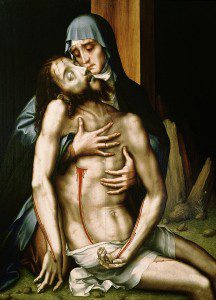 This past Sunday the Church celebrated The Exaltation of the Holy Cross, a feast in which we recognize the far reaching depth of God’s mercy, love and power which in Christ was demonstrated in the humble acceptance of the shame of the cross and it’s victorious transformation into a symbol of victory and hope through the Resurrection. I have continued to meditate on the cross for the past few days. As part of my reflection I have been reflecting upon the Stabat mater, a 13th-century Catholic hymn to Mary which helps us see the sorrow of the cross through the eyes of the crucified Lord’s own mother.
This past Sunday the Church celebrated The Exaltation of the Holy Cross, a feast in which we recognize the far reaching depth of God’s mercy, love and power which in Christ was demonstrated in the humble acceptance of the shame of the cross and it’s victorious transformation into a symbol of victory and hope through the Resurrection. I have continued to meditate on the cross for the past few days. As part of my reflection I have been reflecting upon the Stabat mater, a 13th-century Catholic hymn to Mary which helps us see the sorrow of the cross through the eyes of the crucified Lord’s own mother.
This is one of those treasures of the Church I have only recently uncovered. I am amazed at the number of absolutely heart-crushingly beautiful things that Catholics have created over the years. If you have an hour or so I encourage you to take some time to sit with this hymn. I have included two absolutely incredible settings of the song as well as the lyrics below. Please let me know in the comments below.
|
Vivaldi |
Pergolesi |
|
Stabat mater dolorosa Cuius animam gementem, O quam tristis et afflicta Quae mœrebat et dolebat, Quis est homo qui non fleret, Quis non posset contristari Pro peccatis suæ gentis Vidit suum dulcem Natum Eia, Mater, fons amoris Fac, ut ardeat cor meum Sancta Mater, istud agas, Tui Nati vulnerati, Fac me tecum pie flere, Juxta Crucem tecum stare, Virgo virginum præclara, Fac, ut portem Christi mortem, Fac me plagis vulnerari, Flammis ne urar succensus, Christe, cum sit hinc exire, Quando corpus morietur,
|
At the Cross her station keeping, Through her heart, His sorrow sharing, O how sad and sore distressed Christ above in torment hangs, Is there one who would not weep, Can the human heart refrain For the sins of His own nation, She beheld her tender Child, O thou Mother! fount of love! Make me feel as thou hast felt; Holy Mother! pierce me through, Let me share with thee His pain, Let me mingle tears with thee, By the Cross with thee to stay, Virgin of all virgins blest!, Let me, to my latest breath, Wounded with His every wound, Be to me, O Virgin, nigh, Christ, when Thou shalt call me hence, While my body here decays, Translation by Edward Caswall |












